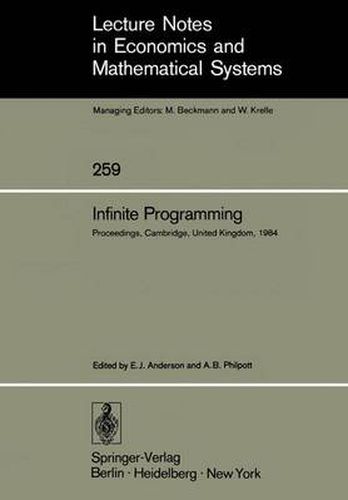Readings Newsletter
Become a Readings Member to make your shopping experience even easier.
Sign in or sign up for free!
You’re not far away from qualifying for FREE standard shipping within Australia
You’ve qualified for FREE standard shipping within Australia
The cart is loading…






This title is printed to order. This book may have been self-published. If so, we cannot guarantee the quality of the content. In the main most books will have gone through the editing process however some may not. We therefore suggest that you be aware of this before ordering this book. If in doubt check either the author or publisher’s details as we are unable to accept any returns unless they are faulty. Please contact us if you have any questions.
Infinite programming may be defined as the study of mathematical programming problems in which the number of variables and the number of constraints are both possibly infinite. Many optimization problems in engineering, operations research, and economics have natural formul- ions as infinite programs. For example, the problem of Chebyshev approximation can be posed as a linear program with an infinite number of constraints. Formally, given continuous functions f,gl,g2, *** ,gn on the interval [a,b], we can find the linear combination of the functions gl,g2, … ,gn which is the best uniform approximation to f by choosing real numbers a,xl,x2, *.. ,x to n minimize a tEURO [a,b]. This is an example of a semi-infinite program; the number of variables is finite and the number of constraints is infinite. An example of an infinite program in which the number of constraints and the number of variables are both infinite, is the well-known continuous linear program which can be formulated as follows. T minimize ~ c(t)Tx(t)dt t b(t) , subject to Bx(t) + fo Kx(s)ds x(t) .. 0, t EURO [0, T] * If x is regarded as a member of some infinite-dimensional vector space of functions, then this problem is a linear program posed over that space. Observe that if the constraint equations are differentiated, then this problem takes the form of a linear optimal control problem with state IV variable inequality constraints.
$9.00 standard shipping within Australia
FREE standard shipping within Australia for orders over $100.00
Express & International shipping calculated at checkout
This title is printed to order. This book may have been self-published. If so, we cannot guarantee the quality of the content. In the main most books will have gone through the editing process however some may not. We therefore suggest that you be aware of this before ordering this book. If in doubt check either the author or publisher’s details as we are unable to accept any returns unless they are faulty. Please contact us if you have any questions.
Infinite programming may be defined as the study of mathematical programming problems in which the number of variables and the number of constraints are both possibly infinite. Many optimization problems in engineering, operations research, and economics have natural formul- ions as infinite programs. For example, the problem of Chebyshev approximation can be posed as a linear program with an infinite number of constraints. Formally, given continuous functions f,gl,g2, *** ,gn on the interval [a,b], we can find the linear combination of the functions gl,g2, … ,gn which is the best uniform approximation to f by choosing real numbers a,xl,x2, *.. ,x to n minimize a tEURO [a,b]. This is an example of a semi-infinite program; the number of variables is finite and the number of constraints is infinite. An example of an infinite program in which the number of constraints and the number of variables are both infinite, is the well-known continuous linear program which can be formulated as follows. T minimize ~ c(t)Tx(t)dt t b(t) , subject to Bx(t) + fo Kx(s)ds x(t) .. 0, t EURO [0, T] * If x is regarded as a member of some infinite-dimensional vector space of functions, then this problem is a linear program posed over that space. Observe that if the constraint equations are differentiated, then this problem takes the form of a linear optimal control problem with state IV variable inequality constraints.